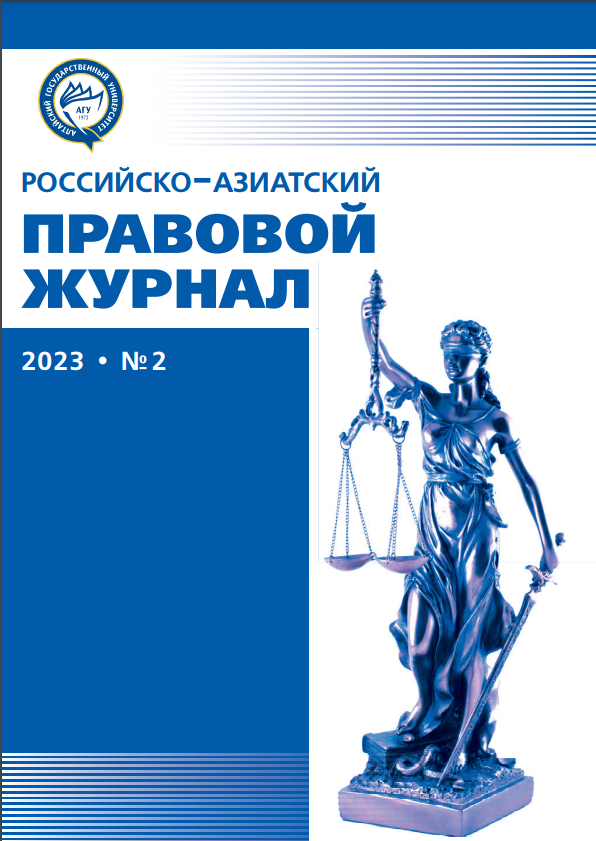THE SCIENCE OF THE THEORY OF STATE AND LAW IN RUSSIA: HISTORY AND MODERNITY
УДК 34.01 ББК 67.3(0)
Abstract
The article analyzes the methodological problems of fundamental jurisprudence. The evolution of thebackbone legal science — the theory of state and law is shown. Its prototype was the encyclopedia of legalsciences, representing in a compressed form the entire body of knowledge about law. In Russia, a full legalencyclopedia appears in the 30s of the XIX century. However, domestic science did not follow the path ofencyclopedism — Russian lawyers focused their attention on understanding concepts and creating legalconcepts. The Encyclopedia of Law actually merged with its general theory. In Soviet times, the problemsof the theory of state and law and the philosophy of law were not separated either methodologically or incontent. During this period, the science of the theory of state and law was an inseparable material on issuesof jurisprudence: the theory of state and law, the history of political and legal doctrines, the philosophy oflaw, the sociology of law, and constitutional law (Soviet state law). At the turn of the 20th-21st centuries,significant changes took place in Russian jurisprudence that influenced the methodology of cognition of law.If for the Soviet legal science there was the only true Marxist-Leninist methodology for the study of state andlaw, then in the conditions of the de-ideologization of social sciences, the authors defend the pluralism oflegal understanding. Modern scientific literature states that the methods of cognition used by legal schools can be different and even mutually exclusive. It is recognized that the methodology sets the point of viewfrom which the researcher evaluates the law, and since these methods are poorly compatible, different viewson the essence of law and the state become an objective reality. A consequence of the pluralistic approachto the study of social phenomena was the need to distinguish between related sciences of the historical andtheoretical cycle.
Downloads
References
Алексеев Н.Н. Основы философии права. СПб. : Лань, 1999.
Васильев А.А. Консервативная правовая идеология Росси: теологические и духовные аспекты. М. : Проспект, 2023.
Лейст О.Э. Сущность права. Проблемы теории и философии права. М. : ИКД: Зерцало –М, 2002.
Михайловский И.В. Очерки философии права. Т. I. Томск : Изд. В.М. Посохина, 1914.
Право. Порядок. Ценности : монография / под общ. ред. Е.А. Фроловой. М. : Блок-Принт, 2023.
Приказ министра высшего образования СССР // Советское государство и право. 1947. №1.
Раз Дж. Авторитет права. Эссе о праве и морали / Джозеф Раз; пер. с англ. И. Дягилевой ; под науч. ред. Д. Раскова. М., 2021.
Ренненкампф Н.К. Очерки юридической энциклопедии. 2-е изд., испр. и доп. / изд. Н.Я. Оглоблин. Киев ; СПб., 1880.
Томсинов В.А. История юридического факультета Московского университета (1755–2010). 2-е изд., перераб. и доп. / отв. ред. проф. В.А. Томсинов. М. : Городец, 2011.
Фролова Е.А. Рациональные основания права: классика и современность. М. : Проспект, 2023.
Шершеневич Г.Ф. Общая теория права : учебное пособие : в 2т. М. : Юридический колледж МГУ, 1995. Т. I.
Russian-Asian Law Journal is a golden publisher, as we allow self-archiving, but most importantly we are fully transparent about your rights.
Authors may present and discuss their findings ahead of publication: at scientific conferences, on preprint servers, in public databases, and in blogs, wikis, tweets, and other informal communication channels.
Russian-Asian Law Journal allows authors to deposit manuscripts (currently under review or those for intended submission) in non-commercial, pre-print servers such as ArXiv.
Authors who publish with this journal agree to the following terms:
- Authors retain copyright and grant the journal right of first publication with the work simultaneously licensed under a Creative Commons Attribution License that allows others to share the work with an acknowledgement of the work's authorship and initial publication in this journal.
- Authors are able to enter into separate, additional contractual arrangements for the non-exclusive distribution of the journal's published version of the work (e.g., post it to an institutional repository or publish it in a book), with an acknowledgement of its initial publication in this journal.
- Authors are permitted and encouraged to post their work online (e.g., in institutional repositories or on their website) prior to and during the submission process, as it can lead to productive exchanges, as well as earlier and greater citation of published work (See The Effect of Open Access).








